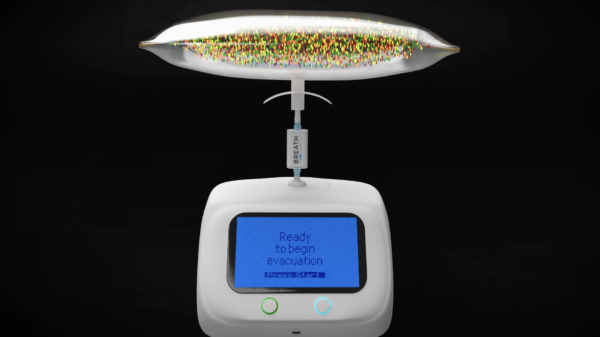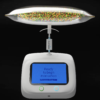bioAffinity Technologies Inc (NASDAQ: BIAF) surged nearly 50 per cent on Friday before easing slightly on Monday, drawing attention to its CyPath Lung diagnostic test.
The movement reflects investor excitement over the company’s new clinical case studies demonstrating the test’s potential to transform early lung cancer detection.
CyPath Lung is a non invasive diagnostic test. It showed remarkable accuracy in identifying Stage 1A lung cancer, the earliest and often most treatable stage.
Investors responded to the studies because the results illustrate two key benefits: enabling earlier, life saving intervention and helping patients avoid unnecessary invasive biopsies. These findings underscore the test’s real world clinical value and its potential to improve patient outcomes.
One particularly compelling case involved a patient whose positive CyPath Lung result led to a biopsy, confirming Stage 1A cancer. Doctors promptly shifted the treatment approach from watchful waiting to immediate intervention.
In contrast, two other patients avoided risky invasive procedures, as the test provided clear guidance for care decisions. Dr. Gordon Downie, bioAffinity Technologies’ chief medical officer, emphasized that these cases show how the test enhances clinical decision making.
The recent studies build on prior milestones for the company. U.S. Medicine Magazine previously highlighted CyPath Lung as a promising tool for veterans, with potential cost savings for the Department of Veterans Affairs. Furthermore, bioAffinity Technologies reported a 1,400 per cent increase in test orders in 2024, reflecting growing acceptance within the medical community. In addition, these case studies provide tangible evidence supporting the test’s effectiveness in early stage detection.
Read more: Breath Diagnostics adopts state-of-the-art mass spectrometer device for lung screening
Read more: Breath Diagnostics leaders promote their mission at Miami investment conference
Company has take steps to support its growth
CyPath Lung’s non invasive nature addresses a major challenge in lung cancer diagnostics. Traditional screening often involves invasive procedures that can be painful, risky, and expensive. The test allows physicians to make precise diagnoses without unnecessary interventions. Furthermore, the clinical data show that CyPath Lung guides treatment decisions, helping patients receive timely care while reducing risk.
The company has also undertaken strategic financial steps to support growth. A 1-for-30 reverse stock split in September 2025 maintained Nasdaq listing compliance. Additionally, a private placement and warrant inducement transaction raised roughly $1.2 million for corporate operations. Consequently, investors reacted positively, with shares jumping on Friday before adjusting slightly on Monday.
The validation of CyPath Lung may reshape the diagnostic landscape. Competitors relying on invasive procedures could face pressure to innovate. Conversely, pharmaceutical companies may benefit as earlier detection identifies more patients for treatment. Furthermore, the broader diagnostics sector is likely to notice the test’s impact on both patient care and operational efficiency.
Globally, the demand for early, accurate, non-invasive diagnostic tools continues to grow. Lung cancer remains a leading cause of cancer deaths, largely because most cases are detected late. CyPath Lung addresses this critical gap, aligning with the industry’s shift toward preventive, precision medicine. In addition, the test may inspire innovation in other cancer diagnostics, particularly liquid biopsies and early cellular analysis technologies.
The new clinical studies also carry potential regulatory and healthcare implications. If CyPath Lung continues to demonstrate clear clinical benefit, faster approval pathways may become more likely.
Read more: Breath Diagnostics opens Respiratory Innovation Summit with captivating presentation
Read more: Breath Diagnostics leader speaks at lung cancer education event in Louisville
bioAffinity focused on adoption in short term
Wider adoption could also influence clinical guidelines and encourage broader public health screening initiatives. Historically, breakthroughs in early detection, such as mammography for breast cancer, significantly improved patient outcomes. CyPath Lung could follow a similar trajectory in lung cancer care.
In the short term, bioAffinity Technologies will focus on expanding adoption. Efforts will likely target insurance coverage, physician outreach, and broader awareness. Peer reviewed publications and presentations at major medical conferences will further build credibility. Long term possibilities include applying CyPath technology to other cancers or diseases where early, non-invasive detection is valuable. Strategic partnerships, scaled manufacturing, and international expansion could unlock additional growth.
Challenges remain. Competition in diagnostics is strong, reimbursement landscapes are complex, and continuous innovation is required. However, if CyPath Lung achieves widespread adoption, it could become a standard of care, improving survival rates and transforming lung cancer screening. Investors should monitor test orders, insurance coverage expansion, and further clinical study results.
Meanwhile, emerging startups and established companies are pushing the boundaries of non invasive lung cancer diagnostics.
Owlstone Medical, for example, is advancing a breath test that detects volatile organic compounds in exhaled air, aiming to identify cancer at its earliest stages. This method could transform screening for high risk individuals, offering a simpler, less invasive alternative to biopsies or imaging.
Similarly, Breath Diagnostics has developed a breath based test that has shown high sensitivity and specificity in clinical studies. I
n addition, the company is raising capital through a Regulation Crowdfunding offering, allowing the public to invest in its technology.
.














